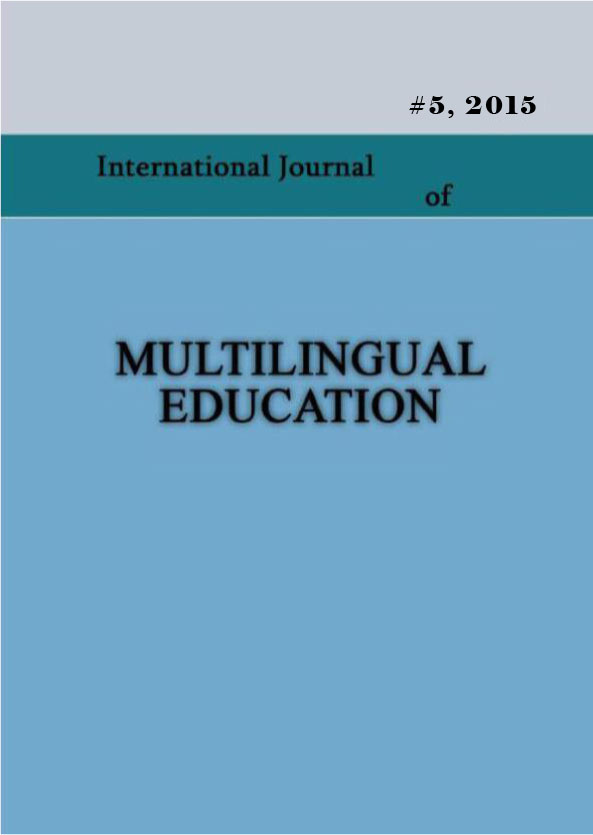TRANSLATION TRANSFORMATIONS IN MULTILINGUAL EDUCATIONAL DISCOURSE
Keywords:
educational management, educational discourse, translation transformation, source language, target language.Abstract
The article deals with peculiarities of translation transformations in modern multilingual educational discourse on the material of four languages: German, English, Russian and Ukrainian. Theoretical part of the research deals with definition of such notions as educational management, educational discourse, translation transformations and their types. As any other branches of modern human activity, educational management undergoes the process of globalization, which means that it interacts with educational and intellectual elements all around the world. These processes take place in multilingual and multicultural surroundings that in its turn might make it difficult to refer to the meanings of some notions in different languages, and educational terms are not an exception here. That is why it is essential to explore the ways how one and the same linguistic meaning is transferred in different languages and to find out translation techniques that facilitate the perception of educational management terms and notions in multilingual surroundings. For conducting the research, different general scientific (methods of induction and deduction, methods of analysis and synthesis, a comparative method, a descriptive method) and specific (method of the analysis of dictionary definitions, methods of contextual analysis) methods have been used. We come to the conclusion that some types of translation transformations, in particular transcription, transliteration, calquing and explication of meaning are widely used in modern multilingual educational discourse. The choice of a particular translation transformation depends in intralinguistic peculiarities of the analyzed languages, and the major difference in using a translation transformation technique can be explained by the peculiarities of technical translation connected with the synthetic nature of the Slavic languages.
References
1. Барановский А. И. Образовательный менеджмент: актуальные проблемы становлення / А. И. Барановский // Современные наукоемкие технологии. – 2008. – №1. – С. 25–28.
2. Бархударов Л.С. Язык и перевод / Л. С. Бархударов. – М.: Международные отношения, 1975 – 240 с.
3. Гак В. Г. Типология контекстуальных языковых преобразований при переводе / В. Г. Гак // Текст и перевод. – М.: Наука, 1988. – С. 63-75.
4. Даниленко Л. Інноваційний освітній менеджмент. Навчальний посібник / Л. Даниленко. – К.: Главник, 2006. – 144с.
5. Карасик В.И. О типах дискурса / В.И. Карасик // Языковая личность: институциональный и персональный дискурс: сб. научн. тр. – Волгоград: Перемена, 2000. – С. 5-20.
6. Карасик В.И. Языковой круг: личность, концепты, дискурс / В.И. Карасик. – Волгоград: Перемена, 2002. – 477 с.
7. Кашкин В.Б. Введение в теорию коммуникации / В.Б. Кашкин. – Воронеж: ВГУ, 2003.
8. Комиссаров В. Н. Лингвистика перевода / В. Н. Комиссаров. – М.: Международные отношения, 1980. – 168 с.
9. Комиссаров В.Н. Теория перевода (лингвистические аспекты) / В. Н. Комиссаров. – М.: Высшая школа, 1990. – 253 с.
10. Образовательный менеджмент: учебное пособие для магистратуры по направлению «Педагогика» / Иванов Е.В., Певзнер М.Н., Ветряков П.А., Федотова Г.А., Шерайзина Р.М., Ширин А.Г. / сост. и общ. ред. Иванова Е.В., Певзнера М.Н. – Великий Новгород, 2010.
11. Олешков, М. Ю. Основные параметры модели профессиональной коммуникации (на примере дидактического дискурса) / М. Ю. Олешков // Социокультурные проблемы в образовании. Межвуз. сб. науч. трудов / под. ред. А. А. Вербицкого, Н. В. Жуковой. М.: РИЦ МГОПУ им. М.А. Шолохова, 2006.
12. Петряков П., Певзнер М. Научные подходы к образовательному менеджменту как междисциплинарной области знаний и практике управления образовательными системами // Hochschule und Schule in der internationalen Diskussion: Chancen und Risiken neuer Entwicklungen. – Baltmannsweiler, 2010.
13. Швейцер А. Д. Теория перевода / А. Д. Швейцер. – М.: Наука, 1988. – 216 с.
14. Шилихина К.М. Ирония в академическом дискурсе / К.М. Шилихина // Вестник ВГУ. Серия: Филология. Журналистика. – 2013. – №1. – С. 115-118.
15. Bolton K. World Englishes / K. Bolton // Davies A., Elder C. (Eds.) The Handbook of Applied Linguistics. – Malden, MA: Blackwell, 2004. – P. 367-396
16. Decker F. Bildungsmanagement für eine neue Praxis / F. Decker. – München, 1995.
17. Goodenough D. R. Cognitive styles: essense and origins field dependence and field independence / D.R. Goodenough. – N.-Y., 1982. – Р. 12–33.
18. Mokyr J. The Knowledge Society: Theoretical and Historical Underpinnings // Available at: http://faculty.wcas.northwestern.edu/~jmokyr/Unitednations.pdf.
19. Schul- und Bildungsmanagement: 100 Aktuelle Begriffe / O. Graumann, R.W. Keck, M. Pewsner, A. Rakhkochkine, A. Schirin. – Hildesheim: Universitätsverlag Hildesheim, 2004. – 242 S.
20. UNESCO World report “Towards Knowledge Societies”. – Paris: UNESCO Publishing, 2005. – 226 p.
21. Wood V.R. Globalization and Higher Education: Eight Common Perceptions From University Leaders // Available at: http:// http://www.anienetwork.org/content/globalization-and-higher-education-eight-common-perceptions-university-leaders
22. Mitchell D.E., Nielsen S.Y. Internationalization and Globalization in Higher Education / D.E. Mitchell, S.Y. Nielsen // Globalization - Education and Management Agendas Ed. by Hector Cuadra-Montiel. – Rijeka: InTech, 2012. – P. 3-22.
Published
How to Cite
Issue
Section
License
Copyright (c) 2015 Liudmyla Glukhova

This work is licensed under a Creative Commons Attribution-NonCommercial 4.0 International License.
Copyright (c) - Authors who publish with this journal agree to the following terms: Authors retain copyright and grant the journal the right of first publication with the work simultaneously licensed under a Creative Commons Attribution-Noncommercial 4.0 International License, which allows others to share the work with an acknowledgement of the work's authorship and initial publication in this journal. Authors are permitted and encouraged to post their work online (e.g., in institutional repositories or on their personal website) prior to and during the submission process, as it can lead to productive exchanges, as well as earlier and greater citation of published work (see The Effect of Open Access). Authors may enter into separate, additional contractual arrangements for the non-exclusive distribution of the journal's published version of the work (e.g., post it to a repository or publish it in a book), with an acknowledgement of its initial publication in this journal.

